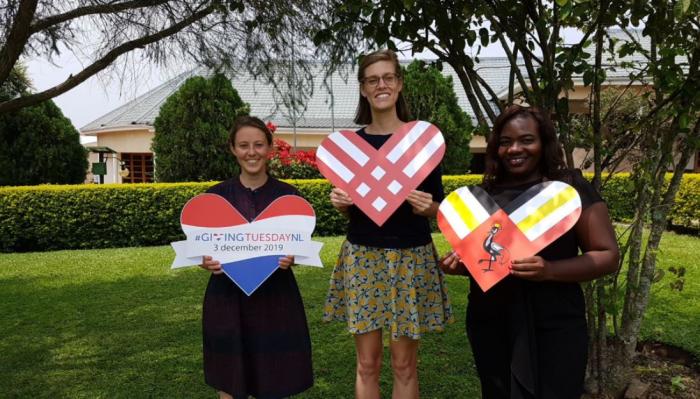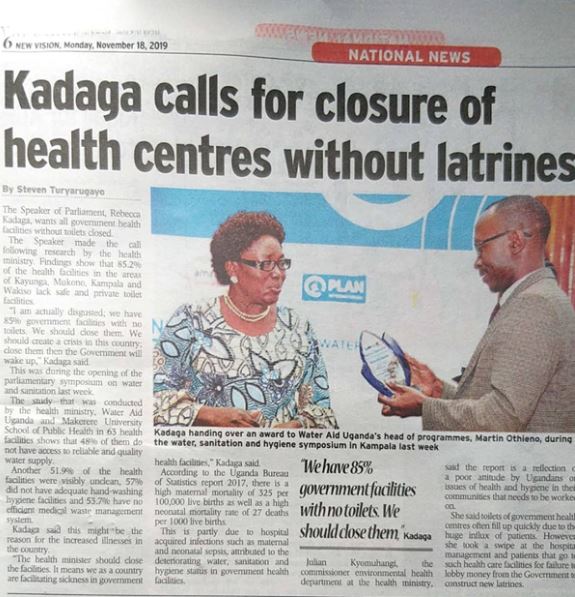This #GivingTuesday we give more information on the global status, what IRC does and could do.
Published on: 28/11/2019
If you follow our social media pages (Facebook, Twitter), you most likely have noticed that this #GivingTuesday, IRC is sharing stories of water, sanitation and hygiene (WASH) in health care facilities and schools in our focus countries: Burkina Faso, Ethiopia and Uganda.
This article is for people who are interested in finding out more about the global discourse around this theme. We have also compiled an overview of key resources and are sharing information about how IRC is strengthening systems in these institutions in focus countries and beyond.

In 2016, 896 million people had no water service and more than 1.5 billion people had no sanitation service at their health care facility. This means millions of people, especially mothers and their babies, face an increased risk of deadly infections. (WHO/UNICEF, 2019 - baseline study). At schools, nearly 570 million children lacked a basic drinking water service (UNICEF, 2019 – baseline study)
In 2018, on March 22nd – World Water Day – the United Nations (UN) Secretary General Guterres, issued a 'Global Call to Action' for WASH in all health care facilities. This managed to wake up and energise the global health and WASH sector.
- according to Dr. Maria Neira, Director of Public Health and Environment Department, World Health Organization (WHO).
Over 80 organisations and 20 governments have made commitments to work towards effective WASH in health care since these global calls were made. IRC was one of these organisations. We have committed to continue working on global, national and local advocacy, investment & funding, technical support and research and learning in Ghana, Burkina Faso, Ethiopia, Mali, Niger and Uganda. From our focus countries, the governments of Ghana and Ethiopia also made public country commitments. Ethiopia has committed to developing a national roadmap or action plan for improving WASH in health care facilities and Ghana has committed to integrating WASH and IPC (Improving and Promoting Community Health) into facility accreditation.
As far as WASH in schools is concerned, its inclusion in the Sustainable Development Goals (targets 4.a, 6.1, 6.2) represents increasing global recognition of their importance. Since 2018 the global databases of the WHO/UNICEF Joint Monitoring Programme for Water Supply, Sanitation and Hygiene (JMP) include data on WASH in schools. According to baseline numbers, in 2016 nearly seven out of ten children had a basic drinking water service, two out of three children had basic sanitation service and one out of two children had a basic hygiene service at their school worldwide.
The global community is collectively working towards making the changes required for clean and safe health care and school environments. If you would like to find out more about how, we have compiled Top 3 resources for further reading about the status of WASH in health care facilities and schools globally.
Top 3 resources on WASH in health care facilities:
Top 3 resources on WASH in schools:
Our #GivingTuesday campaign focuses on sustainability in giving and WASH projects. It highlights IRC's work in schools and health care facilities in focus countries. The following paragraphs reflect on what our teams have been busy with in the last couple of months:
Recently, Uganda's Speaker of Parliament, Rebecca Kadaga was so shocked when she learned that 85% of government health clinics in and around capital Kampala had no toilets, that she called for all clinics to be closed immediately (New Vision, 18 Nov 2019). This was not operationalised, but her statement shows the scale of the problem. Nationwide, only 18% of Uganda's health clinics have basic sanitation. This means that only 18% have:

In Uganda, our IRC team is working in Kabarole district, along with other organisations to support local government to achieve access to safe and sustainable water, sanitation and hygiene services. To improve sustainably, you first need to understand the situation well. So, in order to address the right challenges in health care facilities, IRC has recently worked together with the Centers for Disease Control and Prevention (CDC) on a baseline report, which analysed the status of WASH in these institutions. By having that mapped out, the IRC team can support health care facilities with planning for sustainable WASH services and implementing these plans. For the WASH in HCFs baseline report click here.
With targeted 4000 euros per month IRC can work with hand pump mechanics like Kato – see our #GivingTuesday story - to restore the functionality of rainwater harvesting tanks. We could purchase and install drinking water stations with ceramic filters and handwashing stations with soap to improve hand hygiene and alcohol-based sanitizers for infection prevention. We could also support the district IPC team - who play a major role in the sustainability of services - to provide Continuous Medical Education (CME) and mentorship for WASH in health care facilities to health care workers and cleaners. Through the clean clinic approach, we could address health care acquired diseases due to lack of access to proper WASH services in clinics. We could do all this in 30 health care facilities in Kabarole district.
In Burkina Faso, our IRC team is working in Banfora district, supporting the mayor in achieving access to safe and sustainable water, sanitation and hygiene services for the entire population of the district by 2030. Recently, IRC supported the development of a diagnostic report on the status of WASH in schools and health centres. Based on this, the Catholic Relief Services (CRS) is now implementing the so called "Sanya so" project in schools and health care facilities in the district. The IRC Burkina team is also supporting training people to be trainers themselves of the clean clinic and friendly WASH in schools' approaches. The aim is that these new trainers pass on their knowledge to their colleagues so others can benefit from this too and the intervention is more sustainable.
With the targeted 4000 euros per month IRC could organise WASH days, provide WASH kits in schools and health centres, organise workshops on strengthening social cohesion and organise consultation frameworks for WASH actors in schools and health centres. These activities would all strengthen #WASHsystems in schools and clinics in Banfora district.
In Ethiopia, our colleagues have been working on aligning non-governmental organisations in their work on WASH in schools to support each other, avoid duplication and improve sustainability. IRC has worked with Splash and the Addis Ababa Education Bureau (AAEB) on a landscaping study with the main objective of establishing a strong and aligned learning and coordination platform (read more in a blog titled 'Rallying for School WASH in Addis Ababa' here). Our Ethiopia team has also worked on developing learning documents and on life-cycle costing which all served as input for WISE (WASH in schools for Everyone), a project implemented by Splash and the Addis Ababa Education Bureau.
So, IRC helps with documenting, learning, analysing, sharing and improving the approach of local government and Splash. For example, 100 euros improves managing life-cycle costing of water and sanitation services for a school for 4 years – just 2 euros per month. With the targeted 4000 euros per month IRC can strengthen #WASHsystems in many more schools in Ethiopia.
Burkina Faso, Ethiopia and Uganda are the countries we have invited you to support through our #GivingTuesday campaign, but we also work on strengthening WASH systems in health care facilities and schools in many other countries.
In Ghana, our IRC team is working in Asutifi North District. IRC Ghana together with Asutifi North District and partners, united local and national government leaders, chiefs, market women, water service providers, private sector, local NGOs and sachet water producers to reflect on how to provide WASH services to everyone in the district.
Through a multi-stakeholder consultation process, they jointly created a WASH master plan for the district for achieving the following vision by 2030:
Every person in Asutifi North District will have access to safe and sustainable water, sanitation, and hygiene services in a conducive environment where water resources are sustainably managed.
Part of achieving this vision is addressing WASH in schools and health care facilities, understanding the situation to know what challenges exist and creating a roadmap on how to address these. Therefore, in 2019 IRC has supported Centers for Disease Control (CDC) to conduct a baseline assessment of water, sanitation, hygiene, and environmental conditions in seven health care facilities and 90 schools in the district. Having this information helps IRC to support these institutions with improving their currently low WASH services.
In Mali and Niger, we work on WASH in health care facilities and schools through the Safe Water Strategy initiative, funded by the Conrad N. Hilton Foundation. Read more about recent work in Mali here and in Niger here.
Recent work on global advocacy has brought us in contact with WASH in health care facilities related projects in Bangladesh and in South Africa. In Malawi, WRA Malawi is partnering with IRC and Global Water 2020 to implement a WASH in Healthcare Facilities project which aims for a 30% WASH access improvement at HCFs in Chitipa, Zomba and Dowa. Read more here.
And finally, two more click-throughs:
If you have made it to the end of this article, you probably are really into the topic. Which is great! Let us know if you have any questions or suggestions. We're happy to listen, to talk, to collaborate and grateful if you decide to support our work on WASH in health care facilities and schools this #GivingTuesday.
Check out our social media posts on Facebook and Twitter: @IRCWASH - #GivingTuesday #GivingTuesdayNL
At IRC we have strong opinions and we value honest and frank discussion, so you won't be surprised to hear that not all the opinions on this site represent our official policy.